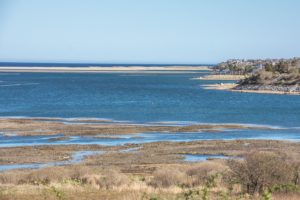EASTHAM — The select board stopped short of withdrawing its support for the Nauset Estuary dredging project at its May 3 meeting, voting instead to meet for discussions with Orleans officials before the Orleans town meeting on May 22, where a $160,000 request to fund the permitting and design of the project awaits voters.
“Obviously, they want the project, and we don’t,” said board member Al Cestaro. “But we at least have to meet them halfway at the table.”
The decision to meet with Orleans officials came as the board considered signing a second memorandum of understanding with Orleans, along with the project’s Expanded Environmental Notification Form (EENF). The EENF was prepared by the Woods Hole Group and paid for by Orleans.
The project proposed in the EENF would dredge 155,560 cubic yards of material from a 5.6-mile channel (including 122,164 cubic yards located within the town of Eastham, from behind Nauset barrier beach) starting in Town Cove and extending to the inlet via the channel behind the Nauset barrier beach. The inlet would not be dredged.
The estimated one-time cost of the project is approximately $3.1 million. According to a memo on the proposal from Shana Brogan, Eastham’s projects and procurement director, because the marsh is an “ever-changing coastal system, about 60,000 yards of material would need to be dredged behind the barrier beach every year.”

Select board member Aimee Eckman said the amount of material to be dredged the first year would fill over “15,000 of those 10-yard dump trucks. We’re talking years of this equipment being out there,” said Eckman.
The proposed dredging would create a 100-foot-wide channel behind the barrier beach and a 50-foot-wide channel in other areas.
Speaking as a town resident, Harry Swift, a member of the Nauset Estuary Stakeholders Group (NESG), warned of unintended consequences from the dredging, which, he said, was a temporary solution.
“If we think about the barrier beach and the protection it provides to the marsh, we’re now dredging a 100-foot channel right behind the beach,” said Swift. “We don’t know what that will do relative to the strength of that beach.”
According to the EENF, shoaling in channels and mooring areas has advanced to a point where many commercial fishing vessels can no longer operate from town landings within the estuary, leaving them to operate from exposed moorings in the center of the navigation channel south of the inlet.
Eckman recommended the town look into other ways to assist the commercial fishing community.
Her suggestion that the town could arrange to fuel the fishing vessels so the fishermen would not need to transport fuel out to their boats was rejected by lobsterman and NESG member John Granlund, who spoke in favor of the dredging project.
“We don’t want fuel out there is the whole point,” said Granlund. “We want to be able to bring the boats in to safe harbor and then out to the inlet. To have the fleet moored up just inside the inlet is a recipe for disaster.”
Board members were also concerned that almost 60 acres of land containing shellfish would be affected by the project. The EENF filing stated that the shellfish would be moved elsewhere during the dredging.
“That’s a thriving business in there for a lot of people that go in and rake inside the estuary,” said board chair Jamie Demetri. “We have a lot of residents that do that both in Eastham and Orleans.”
Eckman suggested the board vote to declare that the intent of the meeting with Orleans was to withdraw its support for the project, but other board members rejected the idea.
“Regardless of our stance here, we have to honor the relationship for a number of reasons,” said Cestaro. “We’re going to have to do business with these people in the future. That’s a fact.”
Board member Art Autorino agreed that no decisions should be made until the meeting with Orleans, adding that he wanted to understand the economic impact of the project on the town’s commercial businesses.
“I’d like to understand how badly turning down this project would potentially hurt some of our commercial businesses, our commercial fisherman. I would like to hear more from them,” said Autorino.



